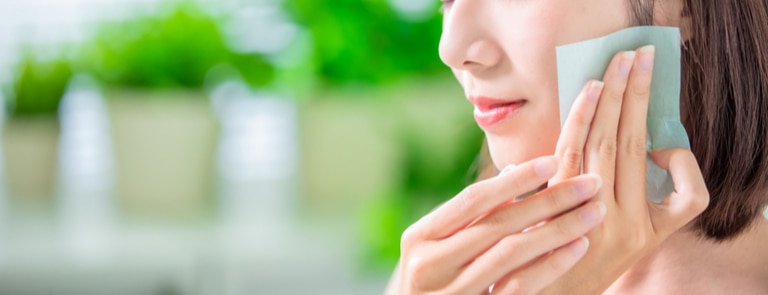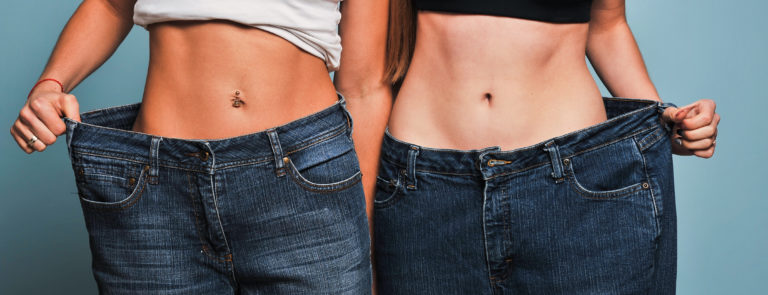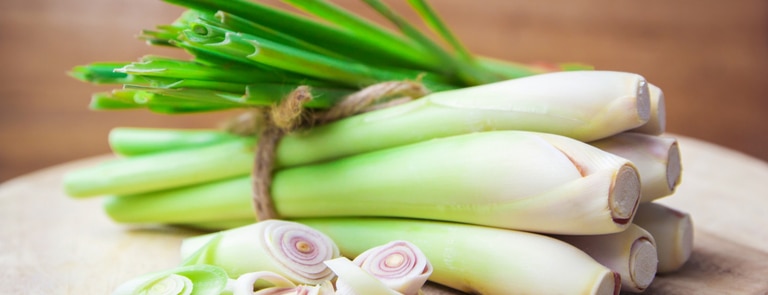15% off £35 OR 20% off £45
Everything you need to know about bakuchiol: uses, benefits & more
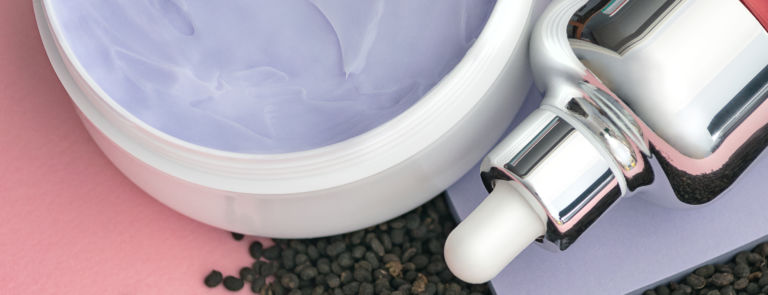
We’ve all heard about plant-based foods, but what about plant-based skincare products?
We’ve definitely heard of them, especially one in particular – bakuchiol.
Bakuchiol’s one of the beauty product buzzwords that’s on everyone’s lips, despite the fact it may be a bit difficult to pronounce!
With so much excitement surrounding this product right now, we’ve decided to dedicate this post to explaining what it is, why it’s so great and how to use it. But that’s not all.
Believe it or not, bakuchiol happens to move in the same circles as retinol. Some are referring to it as being retinol’s ‘gentle little sister.’ Meanwhile, the younger family member is being championed as a natural retinoid in Western skincare research.
Find out the benefits of both retinol and bakuchiol, plus how they can work together in this guide.
Skip to:
What is bakuchiol? And where does it come from?
Bakuchiol is natural a plant extract that’s taken from the leaves and seeds of the Psoralea Corylifolia bakuchiol plant AKA the ‘babchi’ plant.
For years, using parts of the bakuchiol plant has been prevalent in Indian Ayurvedic and Chinese medicines, as well as Tamil Siddha practices, to help calm and soothe the skin.
Interestingly, it’s not actually a retinol and it’s not a newbie to the skincare scene either.
Bakuchiol has reportedly been around on the circuit since the 1970s however, recent research highlighting its effectiveness has resulted in it establishing more of standout status.
So how does bakuchiol work to reduce the appearance of fine lines?
Like retinol, bakuchiol works by helping to boost the skin’s regeneration process.1
As a result, skin looks rejuvenated as it can help to minimise the appearance of wrinkles, and support pigmentation issues as well as increasing skin firmness and elasticity.2
Because it possesses antioxidant properties, one of bakuchiol’s strengths is its ability to help reduce the signs of aging.3
Antioxidants work by counteracting free radicals – those harmful atoms that are responsible for damaging cells and causing dry and loose skin, as well as fine lines and wrinkles.
What is retinol? And how does it work?
In comparison, what is retinol then?
As we all know, retinol helps to reduce the look of fine lines by stimulating collagen production and the production of blood vessels – which also helps with the appearance of skin colour.4
A beginner’s guide to retinol
A beginner’s guide to retinol
What is retinol, and how could it benefit your skincare routine? So, if you’re looking to learn more about this popular product, you’re in the right place.
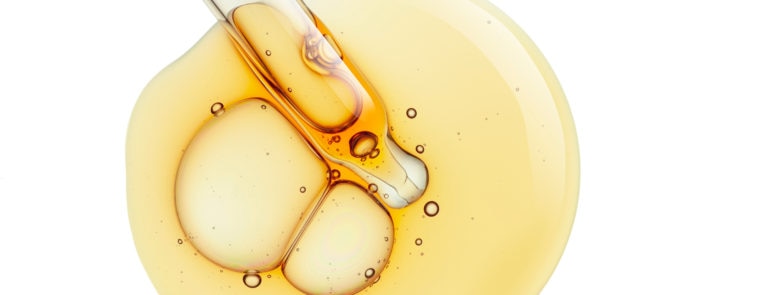

Bakuchiol vs. retinol
If you’ve been doing your skincare homework, then you’ll have discovered that bakuchiol is regarded as the gentler sister of retinol.
While older sis, retinol, may be used to taking all the glory for many years, bakuchiol’s been patiently waiting in the wings for her moment to finally arrive. And that moment, is now.
The benefits of bakuchiol
According to a study carried out by the British Journal of Dermatology in 2018, bakuchiol is in the same league as retinol in terms of its ability to help improve the signs of skin ageing.5
The study also showed that bakuchiol is a ‘more tolerable’ alternative to retinol.
Over the period of 12 weeks, 44 patients were asked to apply 0.5% bakuchiol cream twice a day or 0.5% retinol cream every night. Researchers found that retinol and bakuchiol affected wrinkles and pigmentation similarly.
Let’s run through the top four benefits of bakuchiol:
-
Can be used twice a day
Because it’s not a vitamin A derivative, like retinol, and not as irritating to the skin.6
And thanks to its all-natural, plant-based roots, it’s okay to use bakuchiol alongside other skincare products.
So, this means you can enjoy the benefits of retinol and not have to worry about your skin becoming irritated if you were to use an exfoliator, toner or benzoyl peroxide at the same time too.1
-
Can help collagen production
According to research, it may improve the appearance of fine lines, wrinkles and pigmentation thanks to the effect it has on collagen and blood vessel production.7
-
Isn’t impacted by sun exposure
Unlike retinol, it won’t break down in the sun or make skin more sensitive to UV rays.7
However, it is still worth mentioning that this doesn’t mean you can skip on the sun cream after using it. Check out our range of sun creams here to protect your skin from harmful rays.
-
It’s vegan-friendly
Thanks to its natural, plant-based roots bakuchiol uk is perfectly fine to use if you live by a vegan lifestyle.
The benefits of retinol
-
Can help reduce the signs of ageing
Research has found that it can help with reducing the appearance of wrinkles.8
-
There are different types according to your skin type
i.e. sensitive, ageing or blemish prone skin, so you can find the perfect product with the ideal strength to support your skin needs.
-
Has antioxidant properties
That can help with reducing the appearance of uneven skin.9
Summary
It’s safe to say that both bakuchiol and retinol offer some impressive skincare benefits, but in the battle of bakuchiol vs. retinol, bakuchiol just pips it thanks to its lack of side effects.
Fortunately though, you don’t necessarily have to choose between the two. In fact, you can use both bakuchiol and retinol in your routine to maximise their benefits and potentially reduce the sensitivity of using retinol on its own.5
How to use bakuchiol
Bakuchiol is applied topically as a serum or lotion in the same way that you’d apply a retinol, i.e. before your regular moisturiser or serum.
However, because it’s gentle on the skin, you can use it in the morning and at night.
Unlike retinol, it doesn’t make your skin more sensitive to the sun, but it’s still advisable to use a daily SPF to protect your skin from sun and UV-related damage.1
Who can use bakuchiol serum?
So, who is bakuchiol serum for exactly? Generally, using bakuchiol as a retinol alternative should be suitable for:
- People already using retinol
- People who want to use pro-ageing products
- People who are pregnant or breastfeeding
- People with sensitive skin10,11
Potential risks
Obviously, it goes without saying that everyone’s skin reacts differently to certain products. And while bakuchiol has been proven to be suitable for sensitive skin, there is still a slim chance that your skin could react.
So if you have any worries about this, please speak to a GP or medical professional for personalised advice.
The final say
There are lots of benefits to using bakuchiol, many more than those we’ve listed above. No wonder it’s such a powerhouse of a product right now, what product wouldn’t be when you’ve got retinol as your big sis?!
Oh, and for the record, it’s pronounced ba-koo-heel. Now that’s all cleared up, bring it on!
Last updated: 5 August 2022
- https://www.byrdie.com/what-is-bakuchiol
- https://pubmed.ncbi.nlm.nih.gov/24471735/
- https://pubmed.ncbi.nlm.nih.gov/33185126/
- https://www.health.harvard.edu/staying-healthy/do-retinoids-really-reduce-wrinkles
- https://onlinelibrary.wiley.com/doi/10.1111/bjd.16918
- https://pubmed.ncbi.nlm.nih.gov/29947134/
- https://www.stylist.co.uk/beauty/beauty-bakuchiol-skincare-benefits-best-bakuchiol-creams-serums/249718
- https://www.ncbi.nlm.nih.gov/labs/pmc/articles/PMC6791161
- https://pubmed.ncbi.nlm.nih.gov/28937764/
- https://www.womenshealthmag.com/uk/beauty/skin/a26355222/bakuchiol/
- https://pubmed.ncbi.nlm.nih.gov/33346506/
